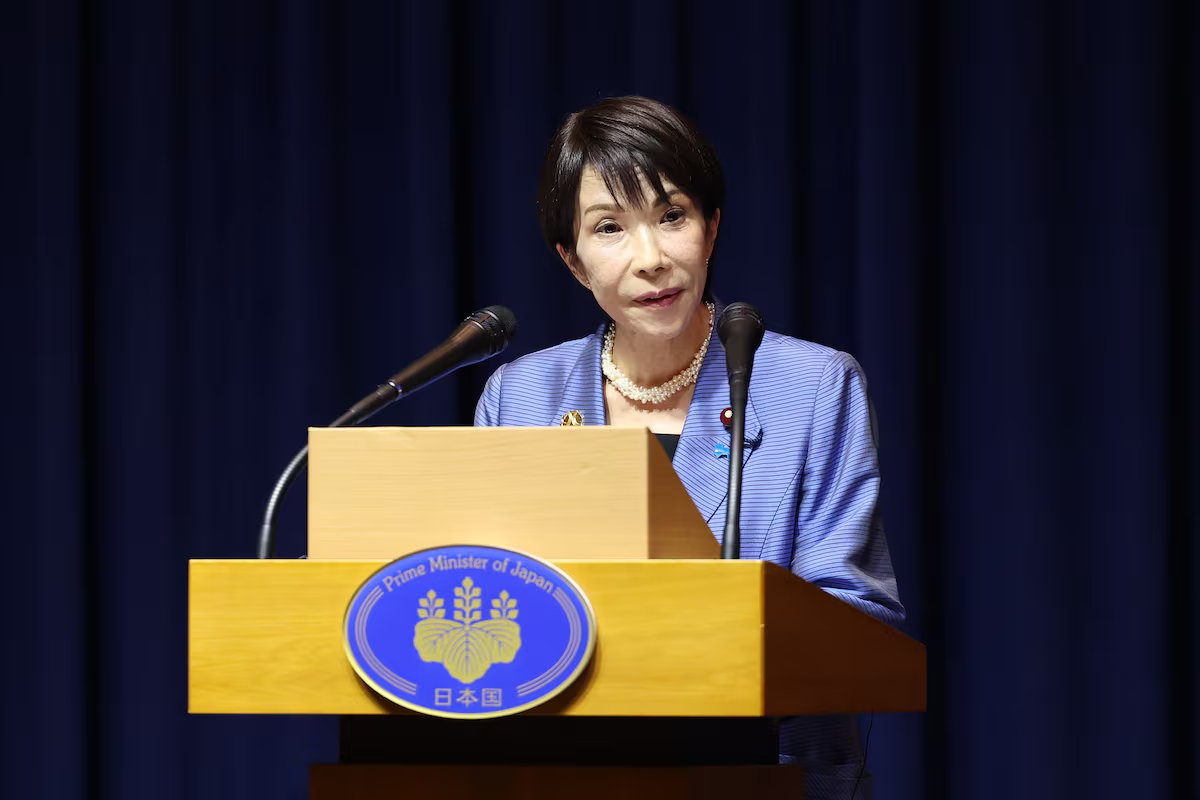China demands Japanese PM retract Taiwan warning or ‘bear all consequences’

Open this photo in gallery:
Japanese Prime Minister Sanae Takaichi has long been a supporter of Taiwan and called earlier this year for Tokyo and Taipei to ‘jointly address defence challenges.’Chung Sung-Jun/Getty Images
China on Thursday demanded Japanese Prime Minister Sanae Takaichi retract remarks she made about how a conflict over Taiwan might prompt a military response from Japan, warning Tokyo would “bear all consequences” if she does not.
Ms. Takaichi, a conservative nationalist and China hawk, became Japan’s first female prime minister in October. At the time, Beijing broke with protocol by not formally congratulating her, and when she met with Chinese President Xi Jinping at a summit later in the month, a photo showed him looking severe and stone-faced, a stark contrast to his easy smiles and laughs with other leaders.
That frostiness has since given way to outright hostility after Ms. Takaichi’s comments about Taiwan, a self-ruled island over which China claims sovereignty – a stance rejected by an overwhelming majority of the Taiwanese people.
Speaking to lawmakers last week, Ms. Takaichi – who wants to increase military spending and amend Japan’s post-World War II pacifist constitution – warned an attack by China against Taiwan could “constitute a situation threatening Japan’s survival.” That is the current bar for the Japanese military to intervene in an ostensibly foreign conflict.
Beijing issued a formal protest and Tokyo responded in kind after a senior Chinese diplomat in Japan, Xue Jian, shared an article about Ms. Takaichi on social media, writing that the “filthy neck which sticks itself in uninvited will be cut off without a moment’s hesitation.”
China accuses Canada of ‘provocative actions’ in Taiwan Strait transit
Mr. Xue later deleted his post, and Tokyo sought to downplay the spat. While refusing to retract her remarks, Ms. Takaichi has characterized them as in-keeping with Japan’s long-standing posture regarding peace and stability in the Taiwan Strait and suggested she would not repeat them.
Any chances of tamping down the drama went out of the window this week however, as Chinese state media launched a barrage of criticism against Ms. Takaichi, with one outlet calling her a “political opportunist” who appeared to have been “kicked in the head by a donkey.”
“If Takaichi keeps crossing the line and talking crap, she might have to pay a price,” said a post by Yuyuan Tantian, a publication under state broadcaster CCTV which often issues commentary on foreign affairs.
Another CCTV publication focused on Taiwan said Ms. Takaichi’s comments had been “extremely egregious in nature and impact” and warned “such reckless words and deeds will have profoundly harmful consequences.”
“Those who start a fire will get burned by it,” the post read. “Japanese leaders attempting to disrupt the situation in the Taiwan Strait and the region are destined to dig their own graves.”
Referring to calls by Japanese lawmakers to expel Mr. Xue, Hu Xijin, an influential former editor of the state-run tabloid Global Times, wrote on social media that “China will inevitably retaliate.”
He called Ms. Takaichi “an evil witch,” who has “successfully ignited a new explosion of mutual hatred between Chinese and Japanese public opinion.”
China begins military drills around Taiwan in ‘stern warning’ to Taipei
Speaking to reporters in Beijing on Thursday, Chinese foreign ministry spokesman Lin Jian said Ms. Takaichi’s comments had been “egregious,” and warned were Japan to “dare to intervene militarily in the Taiwan Strait situation, it will constitute an act of aggression and China will surely strike back head-on.”
Ms. Takaichi, a protege of former Japanese leader Shinzo Abe, has long been a supporter of Taiwan, and called earlier this year – before she became prime minister – for Tokyo and Taipei to “jointly address defence challenges.” While her comments did go further than Japanese leaders have in the past, Tokyo has long warned of the potential risks a conflict over Taiwan could bring to Japan.
Taiwan is a former Japanese colony and Tokyo still controls several islands less than 150 kilometres from the Taiwanese coast, which have come under threat from Chinese military drills in the past, with missiles landing in Japanese waters. Japan also hosts multiple major U.S. military bases which could be targeted by China if Washington were to intervene in a conflict over Taiwan.
The fierce condemnation of Ms. Takaichi comes after a summit between Mr. Xi and U.S. President Donald Trump notably did not touch on Taiwan, a rarity in such discussions and amid a renewed pressure campaign by China against Taipei.
Last week, China launched its third and most-advanced aircraft carrier, the Fujian, which would be expected to be involved in any potential conflict over Taiwan. The People’s Liberation Army has also been seen testing landing barges that could potentially be used in an invasion scenario – though most analysts believe such an action is not imminent and may never be militarily feasible.
In a statement Wednesday, the G7, which includes Japan, Canada and the U.S., expressed concern over “China’s military build-up” and reiterated a long-standing opposition to “any unilateral attempts to change the status quo,” across the Taiwan Strait “particularly by force or coercion.”




